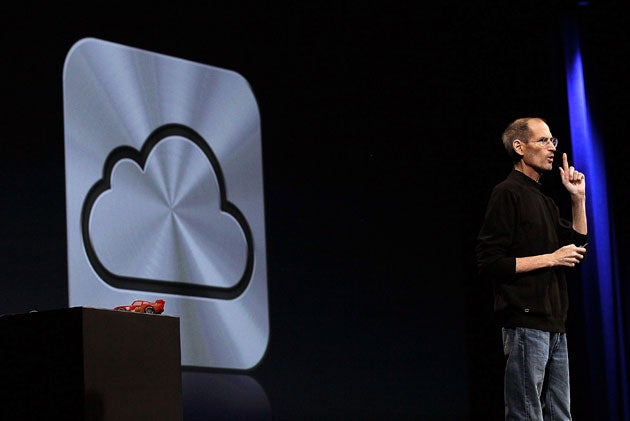Apple's WWDC announcement: Lion, iOS and clouds
David Phelan reports on last night’s Apple keynote

The Apple World Wide Developers’ Conference, for the last three years, has been the platform for Apple to announce its latest software and, more excitingly, the latest iPhone.
But yesterday, a packed house of over 5,000 software developers watched as Steve Jobs introduced nothing but software: the latest operating systems for the Mac computer and for iPhone, iPad, and iPod touch. There was also a new service, iCloud, which stores content on remote servers and makes synchronisation of multiple Apple devices, Macs and PCs simple and wide-ranging.
It was a long keynote – around two hours – and with so many new features and tweaks announced that by the end it was almost bewildering. The latest Mac software, called Lion, is a handsome beast which seeks to take the most appealing aspects of the iPad and apply them to the Mac. So among the 250 new features (told you there was a lot to take in) were full-screen apps. Instead of programs which can stretch to take up most of the screen, these fit the whole display naturally and neatly to make the most of the screen real estate.
Then there’s Mission Control, which arranges all your live programs neatly so you can see exactly what’s where. It’s a handy system which is launched by swiping fingers up the computer trackpad and is one of many new gesture interactions that mimics the touchscreen intimacy of the iPad.
Even more interesting was the pricing and distribution. When the Lion is unleashed, it’ll be not on a DVD but by download through the Mac App Store. What’s more, the price is highly competitive: £20.99, and if you have multiple computers in your household it can be installed on all of them for this price. The lion leaps onto computers next month.
In the autumn, though, comes a radical update of iOS, the system which runs Apple’s iPhone, iPad and iPod touch. Apple calls these “post-PC devices” and at last they will be. Currently, before you can use your shiny new iPurchase, you must connect it to a computer to activate it. With iOS 5, it’ll work without you having to attach it to a computer. Ever.
Some people want an iPad instead of a laptop, Apple said, and iOS 5 is designed to make that possible. System updates can be downloaded over the air, too. The update addresses one of the most resented features of the iPhone, that notifications appear on screen and stay there until you dismiss them. Now, they’ll appear at the top of the screen and you can swipe your finger down the screen to show them all – rather like Android phones, but slicker looking.
When the screen is locked, extra information like weather and stock prices are shown on the display and a double tap on a locked iPhone reveals a camera icon so you can instantly unlock the handset just to take the picture – even if you have a passcode set.
But other Apple announcements seemed based on other apps: Instapaper is a service which lets you save onscreen content to read later. Apple now has its own app to do this. And iMessage is an instant messaging service which seems designed to steal BlackBerry Messenger users – the quick, free service many text-crazy BlackBerry users enjoy – over to Apple’s camp. There’s also heavy Twitter integration so you can sign in and then tweet from a series of apps with added Twitter functionality. Internet browsing, already a strong feature on Apple products, is more elegantly implemented.
But the big news was iCloud, a series of remote services available for free. Cloud computing, where documents, data and more are stored remotely so you can access them from a connected machine like an iPad or a computer, is going to be important this year. Apple already has a cloud service called Mobile Me which keeps your calendar, contacts and email synchronised. It’s a great system: type a calendar event into your Mac and within minutes it magically propagates the entry on to your iPhone, iPad or other subscribed device.
Mobile Me has been controversial (Jobs described it as “not our finest hour”) but the new service is a redesigned version which will be free, instead of Mobile Me’s £59 a year, which will be phased out.
But iCloud goes further. If you buy an app from iTunes, with iOS 5 the app is automatically downloaded to all your gadgets. And every night, iCloud will wirelessly back up your iPhone, say, so that all your hardware is current. It’s a simpler task than now where you must connect by cable.
And there’s a service so you can upgrade your music library. Music you’ve ripped from CD can be replaced with higher-quality tracks from Apple’s library. The iCloud service is rich and wide – so much so that the wider implications of how it will change how we listen to music are still not clear.
It’s due to arrive in the autumn, with iOS 5 and, though Apple’s not saying anything, one might presume that perhaps the next iPhone is set for then, too. What has been spelled out, though, is that when it arrives the new iOS 5 will work with earlier products, going back to the iPhone 3GS as well as the latest ones.
Steve Jobs was subdued for some of last night’s announcements, but when he came to iCloud the glint in his eye, that one he gets when he feels he’s delivering something quite new like the iPad, was as piercing and animated as ever.
Join our commenting forum
Join thought-provoking conversations, follow other Independent readers and see their replies
Comments
Bookmark popover
Removed from bookmarks